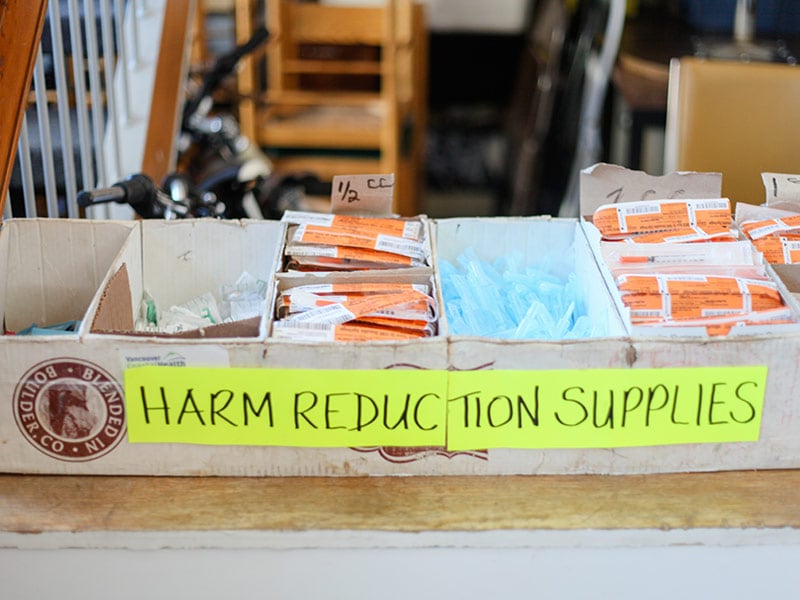As part of my recent series on solutions to B.C.’s drug overdose crisis, I spoke with many people working on the front lines. Here is a collection of their ideas to address the public health emergency now.
1. Stop the war on drugs.
“The war on drugs is a masterful distraction. You can chase fentanyl ’til you have the military chasing it. It’s a distraction from the real problems that are over here. That’s why prohibition just sucks all our energy. Out of the ashes of this disaster, let’s acknowledge we screwed up. It’s a huge opportunity to drill down and let people understand why they use drugs. That’s where you need someone in charge. You need someone saying, ‘Okay, this is not going to happen again.’” — Donald Macpherson, Canadian Drug Policy Coalition director, former City of Vancouver drug policy coordinator
“I’m not talking about going into the corner store and buying heroin or something. But decriminalization is [a] really clear [solution]. And that’s what’s [been] happening in Vancouver, to a certain degree, for many years… the police were just shuffling sand, and that’s why we almost have this little bubble of decriminalization [in the Downtown Eastside] within this larger drug war area, where the police just realize they’re not going to arrest their way out of this.” — Andy Bond, senior director of housing and program operations, PHS Community Services Society
2. Regulate illicit drugs, ending prohibition.
“As long as we have prohibition, it pushes the toxic level of the drugs up because they need to be cut with these unknown quantities of shit in them… I’m sure there are people in the towers downtown who have very good dealers who don’t give them shit because they know they would be in big trouble from these powerful people. People in the Downtown Eastside are subject to the whims of the illegal drug mixing machine.”— Donald MacPherson
3. In the meantime, shift the focus from criminalization to the social determinants of health.
“I would definitely say trauma is a huge, huge, huge, huge, huge piece here.”— Amanda Hamm, youth mental health and addictions care coordinator, Directions Youth Services Society
“The other drivers of addiction are poverty, abuse, trauma, all those things.”— Donald MacPherson
4. Scale up harm reduction.
“The things that we’ve been proposing for many years are safe injection sites, safe inhalation sites, places where you can get the drug scene off the street… the supplies are only part of harm reduction. The other part of harm reduction is to see somebody as a person. And just see them and hear them and grant them some dignity as a person. That’s one of the biggest things, really.” — Marion Allaart, executive director, Vancouver Area Network of Drug Users
“I think that there’s a weird division that happens as viewing harm reduction and treatment as separate. I don’t think they are. I think that harm reduction services such as Insite are part of treatment… but we are very aware, as an organization, that [harm reduction] is only one piece of what is needed. It’s a very important piece. But it is certainly not a solution to everything… it really comes down to emphatically addressing the root causes… I think it’s about addressing stigma, crushing poverty, access to housing… it’s a well-proven, scientific fact that IV drug use is not a random action or a free choice issue. It is embedded in suffering, and it is just one of the many ways that people choose to cope. But I don’t think we’ve created enough pathways out of that lifestyle for people to find hope and healing. I think the supervised injection site is just that starting place of focusing on the human element and bringing people into the human family, saying we’re going to take you out of the street, the alley, the cold, and just welcome you indoors and make sure that you’re safe.” — Andy Bond
5. Improve housing access for people living vulnerably.
“When I’m looking for housing with people [youth aged 17 to 24], it’s in SROs, those types of places because it’s the only thing people can afford — kind of. And even then, that’s with the knowledge that this isn’t the right place to be going. It’s just all that we have. Because if someone’s trying to be sober, living in an SRO is a very triggering place to be… [also challenging is] being able to find affordable housing that’s not just in the Downtown Eastside. People have community there, which is awesome. But there are a lot of folks that I work with who don’t feel safe going down there, or feel very triggered going down there, that sort of thing. So being able to find housing and build a community in a different area, I think, could be quite helpful.” — Amanda Hamm
“You can’t really fight a health epidemic when people are on the streets. It’s hard because it’s too brutal. Even though Vancouver’s quite mild, it’s still a brutal environment. And predatory. There’s lots of good, solid friendship as well, people supporting each other. But it’s kind of extreme. “ — Marion Allaart ![]()
Read more: Rights + Justice

















Tyee Commenting Guidelines
Comments that violate guidelines risk being deleted, and violations may result in a temporary or permanent user ban. Maintain the spirit of good conversation to stay in the discussion.
*Please note The Tyee is not a forum for spreading misinformation about COVID-19, denying its existence or minimizing its risk to public health.
Do:
Do not: